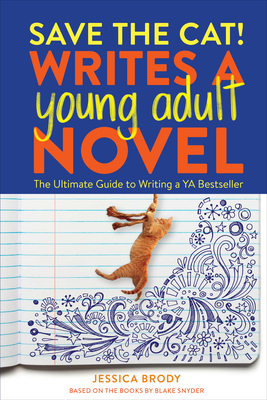






The bestselling Emotion Thesaurus, often hailed as the gold standard for writers and credited with transforming how writers craft emotion, has now been expanded to include 55 new entries
One of the biggest struggles for writers is how to convey emotion to readers in a unique and compelling way. When showing our characters' feelings, we often use the first idea that comes to mind, and they end up smiling, nodding, and frowning too much.
If you need inspiration for creating characters' emotional responses that are personalized and evocative, this ultimate show-don't-tell guide for emotion can help. It includes:
The Emotion Thesaurus, in its easy-to-navigate list format, will inspire you to create stronger, fresher character expressions and engage readers from your first page to your last.

A veteran writing teacher makes a moving (Rick Wormeli) argument that writing is a form of thinking and feeling and shows why it can't be replaced by AI
In the age of artificial intelligence, drafting an essay is as simple as typing a prompt and pressing enter. What does this mean for the art of writing? According to longtime writing teacher John Warner: not very much. More Than Words argues that generative AI programs like ChatGPT not only can kill the student essay but should, since these assignments don't challenge students to do the real work of writing. To Warner, writing is thinking--discovering your ideas while trying to capture them on a page--and feeling--grappling with what it fundamentally means to be human. The fact that we ask students to complete so many assignments that a machine could do is a sign that something has gone very wrong with writing instruction. More Than Words calls for us to use AI as an opportunity to reckon with how we work with words--and how all of us should rethink our relationship with writing.

Method Writing is a powerful approach to finding your deep voice and activating the creative process. Based on a series of concepts and exercises Grapes has used in his writing workshops over the last 30-plus years, Method Writing does more than describe techniques: it takes you step-by-step through a process that will empower your writing and make it unique.



Writing exercises and creativity advice from Barry's pioneering, life-changing workshop
The award-winning author Lynda Barry is the creative force behind the genre-defying and bestselling work What It Is. She believes that anyone can be a writer and has set out to prove it. For the past decade, Barry has run a highly popular writing workshop for nonwriters called Writing the Unthinkable, which was featured in The New York Times Magazine. Syllabus: Notes from an Accidental Professor is the first book to make her innovative lesson plans and writing exercises available to the public for home or classroom use. Barry teaches a method of writing that focuses on the relationship between the hand, the brain, and spontaneous images, both written and visual. It has been embraced by people across North America--prison inmates, postal workers, university students, high-school teachers, and hairdressers--for opening pathways to creativity. Syllabus takes the course plan for Barry's workshop and runs wild with it in her densely detailed signature style. Collaged texts, ballpoint-pen doodles, and watercolor washes adorn Syllabus's yellow lined pages, which offer advice on finding a creative voice and using memories to inspire the writing process. Throughout it all, Barry's voice (as an author and as a teacher-mentor) rings clear, inspiring, and honest.



In Story, McKee expands on the concepts he teaches in his $450 seminars (considered a must by industry insiders), providing readers with the most comprehensive, integrated explanation of the craft of writing for the screen. No one better understands how all the elements of a screenplay fit together, and no one is better qualified to explain the magic of story construction and the relationship between structure and character than Robert McKee.




The Poet's Companion presents brief essays on the elements of poetry, technique, and suggested subjects for writing, each followed by distinctive writing exercises. The ups and downs of writing life--including self-doubt and writer's block--are here, along with tips about getting published and writing in the electronic age. On your own, this book can be your teacher, while groups, in or out of the classroom, can profit from sharing weekly assignments.

Readers connect to characters with depth, ones who have experienced life's ups and downs. To deliver key players that are both realistic and compelling, writers must know them intimately-not only who they are in the present story, but also what made them that way. Of all the formative experiences in a character's past, none are more destructive than emotional wounds. The aftershocks of trauma can change who they are, alter what they believe, and sabotage their ability to achieve meaningful goals, all of which will affect the trajectory of your story.
Identifying the backstory wound is crucial to understanding how it will shape your character's behavior, and The Emotional Wound Thesaurus can help. Inside, you'll find:
A database of traumatic situations common to the human experience
An in-depth study on a wound's impact, including the fears, lies, personality shifts, and dysfunctional behaviors that can arise from different painful events
An extensive analysis of character arc and how the wound and any resulting unmet needs fit into it
Techniques on how to show the past experience to readers in a way that is both engaging and revelatory while avoiding the pitfalls of info dumps and telling
A showcase of popular characters and how their traumatic experiences reshaped them, leading to very specific story goals
A Backstory Wound Profile tool that will enable you to document your characters' negative past experiences and the aftereffects
Root your characters in reality by giving them an authentic wound that causes difficulties and prompts them to strive for inner growth to overcome it. With its easy-to-read format and over 100 entries packed with information, The Emotional Wound Thesaurus is a crash course in psychology for creating characters that feel incredibly real to readers.